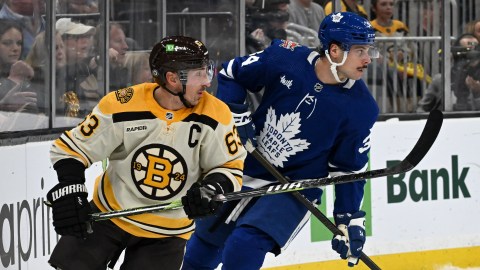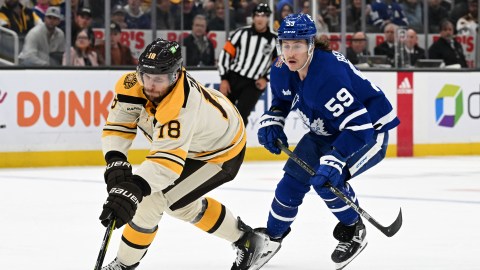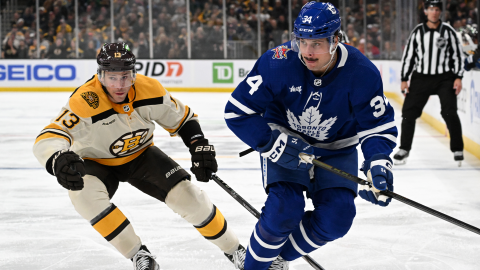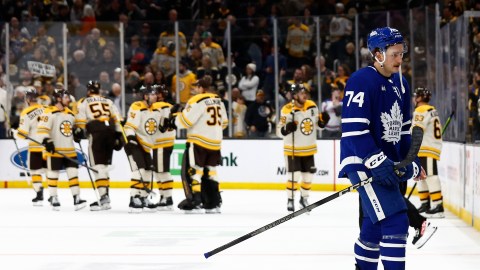Over the past week, there has been a rash of controversial hits in the NHL, leaving at least two players seriously concussed and injured.
Bruins fans remember all too well what happened two years ago this past Tuesday, when center Patrice Bergeron was hit from behind by Flyers defenseman Randy Jones. Bergeron suffered a Grade III concussion on the play and subsequently missed the remainder of the 2007-08 season. He has only recently returned to the form of the terrific two-way player he promised to be before the injury.
Ironically, though, much like it was two years ago after that hit on Bergeron, the hockey world is once again questioning these so-called "dirty" hits and whether or not shots to the head should be automatically penalized.
Last Friday, Carolina forward Tuomo Ruutu hit Colorado's Darcy Tucker from behind in a fashion similar to the Jones hit on Bergeron two years ago. Tucker received 40 stitches and is out indefinitely with a concussion.
Then on Saturday night, Flyers captain Mike Richards laid a borderline open-ice hit on Florida forward David Booth. Booth had his head down and it's questionable whether or not Richards had time to let up. Many, though, believe it was predatory.
So should the NHL be handing down different fines and suspensions based on each case, the result and players' histories? Should the league institute a cut-and-dry system for anything deemed a head shot or cheap shot? Or do they stick with the current system and hope the players can police themselves?
"It's a fast sport," Bruins veteran forward Mark Recchi said. "Things happen really quickly and you do have to keep your head up. If Booth had his head down, he needs to know he may get hit there."
Recchi admits that players today do not have the same respect for each other that they had when he came into the league in 1989. He doesn't think, however, that it's gotten so bad that a new rule or penalty needs to be implemented.
"I definitely think there is a different respect out there now," Recchi said. "There's a fine line that's being crossed, for sure. But if a guy has his head down or admires his pass, are you supposed to stop hitting him even if the hit is clean? This is a fast, physical game and we don't want to lose that. Unfortunately, yes, guys are going to get hurt, but we all know that and we play knowing that. It's part of the game.
"It's just such a gray area," Recchi continued, "that I don't think you can institute a penalty without taking away some of the physical part of the game. You hope that for the most part guys aren't going out there and trying to hurt people or seriously injure them, but, yes, that line is being crossed more than it used to be and the players have to address that."
Bergeron still feels the same way today that he did two years ago when his concussion-related nightmare began. The game needs to keep its physicality, but players must have more respect for each other.
"I said what I said after that hit and my feelings remain the same," the now 24-year-old Bergeron said. "We all have to be responsible for each other on the ice. And sometimes careers can be ended, so we need to be careful. I know it's a fast game and I'm not saying don't hit, but think twice when a player is in a bad spot."
For Bergeron, there's still no place in the game for those hits like the one Tucker received from Ruutu.
"I'm sure Ruutu felt bad about it after, but that's easy to say after," Bergeron said recently. "You have to respect when the other guy is in that position, and there's other ways to get the puck back."
Bruins captain Zdeno Chara echoed the sentiments of Recchi and Bergeron. Chara once played with former NHL defenseman Darius Kasparaitis who often walked a fine line between clean and dirty.
"Avoiding the head shots and low blows to the knee have to be a priority for the players and the league," Chara said. "I know that earlier in my career, I played with Darius Kasparaitis and he [was notorious for] those kind of hits. But not for a while have we had anyone going low like that until recently. There's a way to do it, but it can be dirty obviously as well, and we're seeing that lately."
Hockey Night in Canada icon Don Cherry has been a huge proponent of the idea that players' equipment should be altered and regulated. He says that the armor they wear now is just that — battle armor — and that it can cause serious injury on increasingly bigger and faster players. Chara agrees with Cherry and said players need to consider that when they're on the ice.
"Players are getting bigger, stronger and faster every year and the equipment is more advanced and bigger, so there is no excuse to hit low or for the head," Chara said. "They should be aiming for shoulder-to-shoulder or on the chest. It's too dangerous otherwise, and players need to respect that."
Chara doesn't buy it when people say bigger players — like himself — can't avoid hitting the opponent's head if they're going to play physically.
"I don't think that there is an issue of the height, really," Chara said. "If I'm hitting smaller guys, I can get down low enough or position myself to hit properly. It's fast out there, but you can do it. If a guy is 5-foot-10, I can always find a way to hit shoulder-to-shoulder and hit clean."
Chara also made a point about the new slew-footing phenomenon. Slew-footing is when a player uses his feet to knock an opponent's skates out from under him with a kicking or leg-dragging motion from behind. Capitals star Alexander Ovechkin was recently fined $2,500 for this act, a move for which he has become notorious around the NHL. Many believe he has escaped penalties, fines and suspensions because of his star power. But Chara, for one, was happy to see the league finally buckle down on the back-to-back Hart Trophy winner.
"There's been more of that lately and it's a dangerous play, too," Chara said of slew-footing. "I know that people want to go see star players but you can't have double standards. A slew-foot is a slew-foot no matter who does it."
The bottom line among most Bruins players, though, appeared to be that the NHL just needs to be clearer and more consistent when they issue penalties. Meanwhile, players need to appreciate the dangers of the game and respect each other.
"That's what has to happen. Players need to have more respect and realize how dangerous it can be," Recchi said. "This game is physical and hitting is a big part of it. Accidents are going to happen, but there's ways to avoid them. Keep your head up and respect each other."



